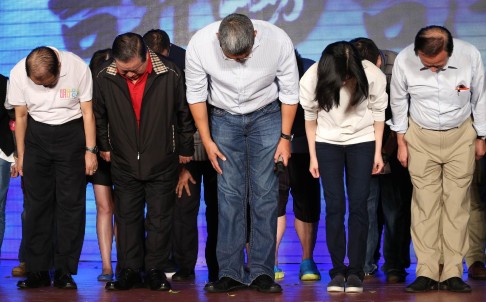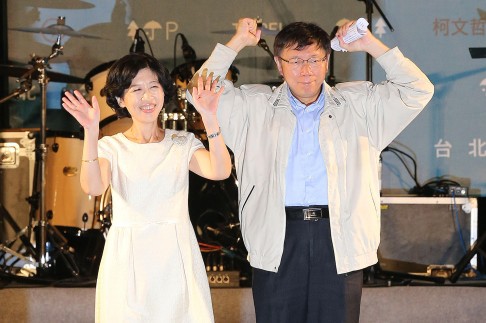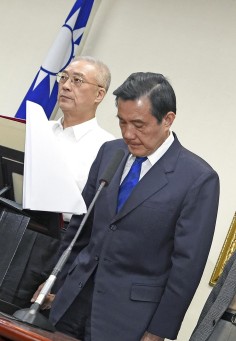Voters punish KMT with landslide defeat in Taiwan's local election
Premier Jiang Yi-huah resigns as ruling party suffers its worst defeat in decades, putting the DPP in the box seat for 2016 presidential poll
PUBLISHED : Saturday, 29 November, 2014, 7:25pm
UPDATED : Sunday, 30 November, 2014, 5:23am
Lawrence Chung and Minnie Chan in Taipei and Fanny W.Y. Fung in Taichung

The KMT's Taipei candidate, Sean Lien Sheng-wen, and supporters bow.
Taiwan's ruling Kuomintang (KMT) yesterday suffered a landslide defeat in the island's biggest-ever local elections, a result analysts saw as voter payback for the failures of the mainland-friendly administration.
Of the six municipal races considered litmus tests for the 2016 presidential poll, the KMT was only able to win New Taipei City, losing not only Taoyuan, but also its key traditional strongholds in Taipei and Taichung, down from the four cities it used to control.
The setback - the worst since the KMT came to power in Taiwan in 1949 - prompted Premier Jiang Yi-huah to resign to take full responsibility for the defeat.
"The election results have showed that voters are not satisfied with the government's administration," Jiang said. He said President Ma Ying-jeou had accepted his resignation.
Hit hard by a series of protests against a services trade pact signed with Beijing, a food safety scare, missteps in education reform and worries over class and income inequality in the past year, the KMT faced a tough challenge from the main opposition Democratic Progressive Party.

Incoming Taipei mayor Dr Ko Wen-je and his wife Peggy Chen.
Campaigning on a pledge to punish the KMT for its poor performance, the DPP, which already held the southern municipalities of Tainan and Kaohsiung, made two big gains - Taoyuan and the more important central city of Taichung.
The DPP was keen to secure Taichung because it would allow the pro-independence party to expand its influence from central Taiwan to the island's north, boosting its chances in 2016.
The DPP also captured nine other cities and counties in what was viewed as its best result since its founding in 1986.
"But this has also made us nervous. We must learn from the lesson of the KMT defeat and keep in mind the desires and feelings of the public, who will withdraw their support if dissatisfied," DPP leader Tsai Ing-wen said, confirming her party had won 13 cities and counties.

Vice-President Wu Den-yih and President Ma Ying-jeou react.
Ma apologised to supporters for the KMT setback. "I have heard their voices and I will not evade my responsibility to start reforms," he said. But he stopped short of saying whether he would step down as KMT chairman.
The loss of the capital Taipei was a serious blow to the KMT as the ruling party's political territory shrunk from 15 cities and counties to six. Two other counties - offshore Lienchiang county and the eastern county of Hualien - went to independents.
A downbeat Sean Lien Sheng-wen, running for Taipei mayor, was the first KMT candidate to concede defeat.
Lien, 44, lost to independent surgeon Dr Ko Wen-je, who pledged to bridge the long-time KMT-DPP political divide.
Several minutes later, Jason Hu Chih-chiang, three-time mayor of Taichung, another important municipality held by the KMT, threw in the towel to DPP challenger Lin Chia-lung. "I give my blessing to Mayor Lin," Hu said.
The KMT's Eric Chu Li-luan held on as New Taipei City mayor but said he and the party needed to do some soul-searching to regain support. Chu lost at least 150,000 votes yesterday from the more than 1.1 million he gained in the last elections in 2010.
In Beijing, the State Council's Taiwan Affairs Office said the mainland authorities took note of the island's electoral results and hoped compatriots across the Taiwan Strait would value the improving bilateral ties to continue to promote peaceful development of cross-strait relations.
